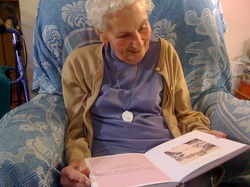TELLING YOUR LIFE STORY IS GOOD FOR YOUR HEALTH
with Rebecca Skinner P.0401 808 335
"When you make loving others the story of your life,
there’s never a final chapter, because the legacy continues.
You lend your light to one person, and he or she shines it
on another and another and another. " - Oprah Winfrey

'KEEPERS OF THE CULTURE" - as we age we often feel the need to get involved with volunteer work, community activities, and other forms of “giving back”. It becomes fulfilling to share our life's lessons and we become motivated to develop new strategies for dealing with unresolved conflicts and unfinished business. Personal story telling helps fulfill these needs.
A SIGN OF SENILITY? It wasn’t that long ago that “people believed reminiscing was a sign of senility—what we now call Alzheimer’s disease,” wrote Robert N. Butler (Kunz 2007). However, after working with healthy volunteers for 11 years Butler concluded that reviewing one's life was a normal and beneficial function of the later years.
BENEFITS FOR THE ELDERLY Dr. Gene Cohen, author of The Mature Mind, believes recalling one's life is critical saying, “Autobiography for older adults is like chocolate for the brain.” He says brain scans on people reminiscing, aged in their 70s and 30s, found the entire hippocampus “lit up” in the older group, while the 30-year-olds utilised only one small part of the left hippocampal region.
BENEFITS FOR THE YOUNG However, research by James W. Pennebaker and Janel D. Seagal, University of Texas researchers in their scientific paper in the Journal of Clinical Psychology,proves young people also benefit. They say putting emotional upheavals into words gives people a sense of control over their lives. Benefits include improvement to immune function, lowering pain levels, a decrease in depression and even improved exam grades.
BENEFITS FOR ALL They say positive health and behavioural effects have since been found with maximum-security prisoners; medical students; community-based samples of distressed crime victims; arthritis and chronic pain sufferers; men laid off from their jobs, and women after delivering their first child. Benefits were found regardless of social classes and ethnicity in a variety of countries around the world.
BOOST TO THE IMMUNE SYSTEM Four different laboratory studies report that recording one’s life experiences produces positive effects on blood markers of immune function including t-helper cell growth; antibody response to the Epstein-Barr virus; and antibody response to hepatitis B vaccinations. Other studies indicate that recalling one's life is associated with lower pain and medication use and, in a sample of students taking professional-level exams, lower levels of depression. Additional experiments have demonstrated that writing is linked to higher grades in college and faster times in gaining new jobs among senior-level executives.
INCREASE IN SELF WORTH Other research into telling life stories has involved the elderly, showing it increases self worth. Often older people feel less able to contribute and, as a result, their lives appear less fulfilling. Sharing their stories enables them to contribute something worthwhile that will help educate future generations. Of course, it also takes their minds off their limitations and is particularly helpful to those facing memory loss and dementia as it helps prompt past experiences and emotions.
FOR THE TERMINALLY ILL In the Lancet Oncology Canadian researchers revealed around 70% of terminally ill patients reported higher quality of life and a greater will to live after participating in "dignity therapy" – a conversation with a trained interviewer about their life, feelings, memories and hopes for their families resulting in transcripts they could share. Behind Dignity Therapy is the idea of "Generativity," the ability to guide the next generation, with patients comforted knowing they are creating something that will last beyond their death.
THE WRITTEN WORD The therapy was found to be most effective when a patient's answers were presented in written form as the written word is maintained through time. Also some patients did not want recordings as their voice or appearance gave away their sickness, which was not how they wanted to be remembered.
MORE BENEFITS The Journal of Palliative Medicine says another study by Michigan’s School of Social Work shows that family members who spend time creating a scrapbook with photographs or videotaping family stories can help lessen breathing difficulties of patients with chronic, life-limiting illnesses while increasing the sense of meaning in their life and strengthening family ties.
LEGACY PROJECT As a result of this study ‘The Legacy Project’ has been set up, helping sick people tell their life story, but this time examining the impact on both patient and family members. This study, involving researchers at U-M and the University of Alabama, set up an intervention group which had help working with the person and their family creating a personal legacy, either written or recorded. Another group only received support telephone calls.Caregivers in the second group found their patients did not often engage socially, while patients in the intervention group became more talkative and were more active than caregivers in working on their legacy. Their caregivers reported reduced stress and depression.
CONCLUSION It makes sense for everyone that recalling their life story helps come to terms with any regrets while acknowledging achievements. It helps confront memories, helping us discover how they have affected our beliefs and actions, which may have held us back from living life to its fullest. So recollecting can help us grow as individuals, whatever age we are.
REBECCA SKINNER, Editor and Author
Celebrating Life's Chapters
E: [email protected]
P: 0401 808 335
Covering Sydney, Newcastle, Hunter Valley, Port Stephens, Central Coast, Tamworth regions and more..
